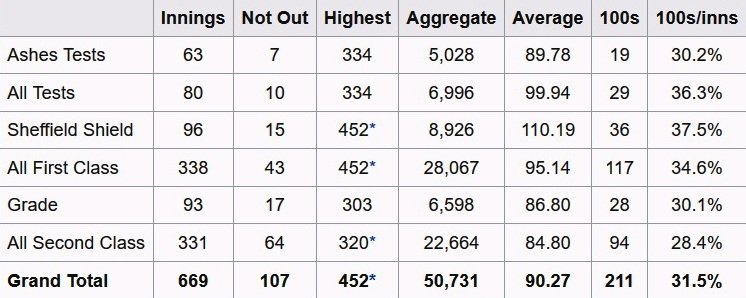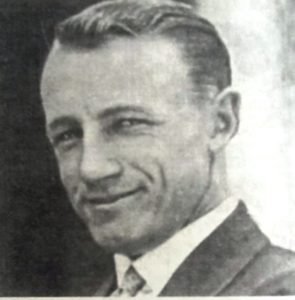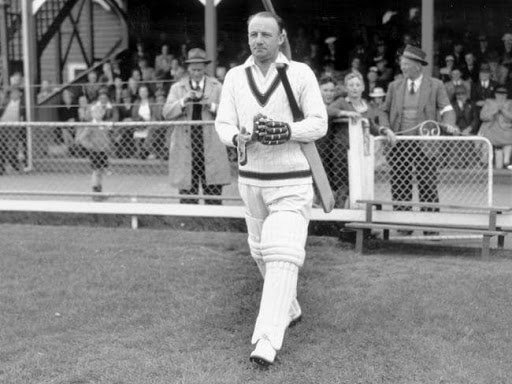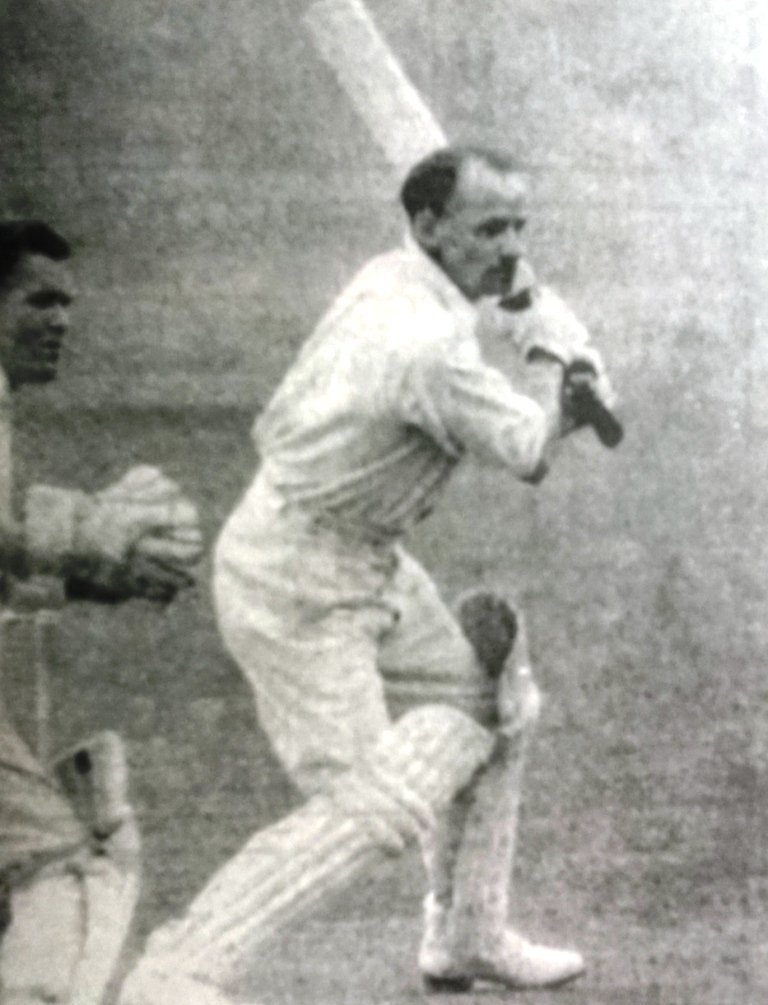This article was published at the death of Sir Donald Bradman in 2001. The greatest Australian cricketer of all time, and in the eyes of many the greatest cricketer from any country, has died at the age of 92. Sir Donald Bradman, who had reportedly been in failing health for some time, died on Sunday morning (February 25, 2001) at his home in the Adelaide suburb of Kensington after a bout of pneumonia.
He is believed to have died peacefully in his sleep. Sir Donald Bradman played 52 Test matches for Australia between 1928 till 1948. He scored 6,996 runs at a phenomenal batting average of 99.94. He was also a highly successful captain and later enjoyed similar success as an administrator.
Donald George Bradman was born in Cootamundra, New South Wales on August 27, 1908. He grew up in the town of Bowral, southwest of Sydney, which now bears a cricket ground and museum in his name. Bradman moved to Sydney after being spotted by talent scouts. He made his first-class debut for New South Wales in December 1927, scoring 118 and 33.
Don Bradman was selected to play for Australia at the age of twenty after just nine first-class appearances, making his Test debut against England in Brisbane in November 1928. Demoted to twelfth man for the following game, he returned to the Australian side for the third Test of the 1928-29 series at the Melbourne Cricket Ground.
He scored 79 and 112 in that game and never looked back. In the following season, he scored 452 not out for New South Wales against Queensland, a world record that stood for nearly thirty years. Later on, Hanif Muhammad beat this record scoring 499. After that, Brian Lara scored 501 against Durham in 1995.
His highest score in Test matches was 334, made against England at Headingley in 1930. In a career that was interrupted by the Second World War, Bradman played his final Test match at The Oval in 1948, at the age of forty. He was captain of Australia from 1936-37 until his retirement, winning 15 Tests as captain and losing three.
His 1948 team which he led to England is regarded as one of the best of all time. Bradman moved to South Australia in 1934 to accept a job offer and played Sheffield Shield for that state until his retirement from the first-class game in 1948-49. In all first-class crickets, he scored 28,067 runs at an average of 95.14, including 117 centuries – approximately one hundred for every three visits to the batting crease.
Idolized during his playing career like no other Australian cricketer – or few other Australian sporting heroes – Bradman (simply “The Don” to millions) was regarded by many prior to his death as the greatest living Australian. Bradman married Jessie Menzies in 1932. She died in 1997, Sir Donald describing their 65-year marriage as “the greatest partnership of my life”.
He was knighted in 1949 for services to cricket, and in 1979 was appointed a Commander of the Order of Australia (AC), the highest civilian honor that can be bestowed on an Australian in modern times. Sir Donald was to receive a private funeral in accordance with his wishes.
Bradman was the greatest batsman who ever lived’ England Test bowling wizard Fred Trueman led the tributes to Australian batting legend, Sir Donald Bradman, following the announcement of his death aged 92 on February 25. Trueman, known as Fiery Fred and one of England’s finest ever pace bowlers although fortunately for his average he never faced Bradman in a Test, claimed it was the passing of a legend.
Bradman retired from Test cricket in 1948 with a record that is never likely to be challenged. In 52 Tests for Australia, Sir Donald amassed 6,996 runs at an average of 99.94 from 80 visits to the crease, with 10 double centuries and two triple centuries among his Test knocks. Only a handful of modern cricketers have made more runs at about half Bradman’s average and from twice as many Tests.

Had World War II not deprived him of his best years, he would doubtless have set yet more records. In all first-class crickets, Bradman scored 28,067 runs at 95.14, including a staggering 117 centuries, 31 double centuries, five triple centuries, and one inning of 400-plus.
Sir Donald Bradman was possibly the greatest batsman who ever lived,” Trueman said. I found him to be a great friend and a very nice man and when I went to Australia I used to go and see him and became very friendly with him. I would love to have had the great honor of bowling against him that would have been marvelous.
He was a wonderful man and it was a passing of a legend. When asked if he thought anyone could ever surpass Bradman’s status in the world game, Trueman said: “I would not have thought so, never again or before. He was simply the best and I am very sad.
Former England captain Brian Close pinpointed another quality in the modest Bradman’s character. “He was never overpowering with his deeds, he was meek in some ways and did not thrust it down people’s throats. Today’s players could learn a lot from him. It is a sad day for cricket in general because he was so well-liked and looked up to,” added the former England opener.
Another England legend, former batsman Tom Graveney said that a Wisden poll summed up his greatness and standing in the sport. When Wisden asked 100 people for their five cricketers of the century, he got 100%. He was a wonderful man. “He was the wise man of cricket and was in a class of his own. I cannot think that anyone would come anywhere near him and he is without any question Australia’s greatest ever sportsman,” he said.
Another icon of English Test cricket former umpire Dickie Bird agreed that Bradman’s feats will never be matched. “No one will get near that average,” he said. “The Bodyline series will always be remembered but you also have to say that he skippered the Australian side in 1948 and that was possibly the best Test side that has ever played the game. He was a wonderful player, who seemed to caress the ball. He was a genius,” Bird added.
Former England skipper Mike Gatting also joined in the compliments. He was the greatest player of his generation, there is no doubt about that,” said Gatting. “People used to write in for autographs from him long after he retired from playing. He made a lot of people very happy.
I hope he will be remembered for the great player he was.  No one scored so freely again. He seemed to be ahead of his time by such a long way.
No one scored so freely again. He seemed to be ahead of his time by such a long way.
He was a very gifted player,” he added. Little Master proposes ‘Bradman Day Former Pakistan cricketers last month mourned the loss of Australian batting legend Sir Donald Bradman and suggested the cricket world should remember him with a “Bradman Day” every year.
Bradman, whose average of just fewer than 100 in Test cricket is unlikely to be matched, died after a short illness aged 92 in Adelaide on February 25. Former Pakistan captain and batsman Hanif Mohammad said the cricket world would never forget him. “Bradman’s name and deeds will remain etched in memories forever but the cricket world must remember him through a “Bradman Day’ every year,” said Hanif, who was known in his day as the Little Master’.
Hanif Mohammad broke Bradman’s highest first-class individual record of 452 with a masterly 499 in 1958-59. “When Pakistan toured Australia in 1964-65 Bradman came to see me and was surprised. I remember he said “Come on, this short man has broken my record? I thought he would be six feet five’,” Mohammad said.
Don Bradman retired from Test cricket in 1948 with a record that is never likely to be challenged. In 52 Tests for Australia, he amassed 6,996 runs at an average of 99.94 from 80 visits to the crease, with 10 double centuries and two triple centuries among his Test knocks.
Zaheer Abbas, called the “Asian Bradman”, remembers meeting “The Don” in Adelaide in 1972. “Sir Don knew I had scored 274 against England in 1971 and he praised my batting skills, saying ‘you possess the rare quality of hooking on the front foot,” Abbas said. “Great people never die and Bradman is the greatest batsman the cricket world has seen until now and his records will be hard to beat in the years to come.”
Another former Pakistan captain Fazal Mahmood acknowledged Bradman’s services as “hard to match”. Mahmood narrowly missed a chance to bowl to Bradman when he pulled out of the Australia-bound Indian team in 1946-47 and opted to migrate to the newly created state of Pakistan. “Had I decided to go with the Indian team I would have played against him but it was not in my face,” he said. Bradman without a peer then and now:
Richard Hadlee said; the late Sir Donald Bradman kept the game simple and his philosophies on batting are still valid today, New Zealand’s finest cricketer Sir Richard Hadlee said. “The Don was without peer in his time and even today. He demonstrated wonderful skills and very simple batting.
I read his coaching book many years ago and his approach to batting is still applicable today. “He was legendary, an icon of the game, and the greatest cricketer ever,” he said. Hadlee’s father Walter, a former New Zealand Test captain, said one of his most poignant memories of the master batsman was seeing him in action for South Australia against the tourists in Adelaide 64 years ago.
Don Bradman played in that game and he was 11 not out at the end of the first day after we batted. “As of 12th man, I was free to look around the next morning to see the crowd pour in to watch Bradman batting Jack Cowie got him out straight away for 11 – caught behind by Eric Tindall. I was outside the gate when the word went around the queues he’s out, he’s out.
I would say two-thirds of them went home” Hadlee met Bradman in Sydney en route to the 1949 tour of England and relished his brief encounter. “He was a legend or use any term you like but he was certainly the greatest living Australian and the greatest batsman the game has ever known. That cannot be questioned. “He was a genius.
He scored 974 runs in his first Test series in England, averaged 99.94 in Tests, and scored a hundred once every third inning, what more can you say?” As a player, Bradman came to New Zealand once on his way to Canada in 1930 with an Australian side captained by Arthur Mailey but he never played a shot.
The game was played in Wellington but Bradman didn’t play I believe went fishing which was a bit of a sore point with the public. That was the only excursion he had to New Zealand in his playing days.” Hadlee was convinced Bradman would be a handful for bowlers had he batted in the modern era.
All at New Zealand Cricket, and I’m sure all lovers of the game, will be saddened to learn of the passing of Sir Don Bradman. “He was undoubtedly the world’s greatest batsman; he was also a true gentleman and epitomized all of the values which have been long associated with our game – honesty, integrity, humility.
The game is greater for him playing it.” Former New Zealand captain and New Zealand Cricket administrator Graham Dowling said he met Bradman at his house in Adelaide on one trip. “Cricketers the world over have valued so highly meeting with the great man. It is terribly sad to hear this news. He was an absolute legend and the cricket world will be in deep shock.
He was not only the greatest player of all time but he followed up his career by serving as an administrator and chairman of the Australian Cricket Board. “His views on cricket issues were always widely sought and valued because he had the interests of the game at heart,” Dowling said Bradman was one of the greatest figures of all time and no one would ever equal his test statistics.
He has had long innings but no one ever had the magnetism that he possessed. He brought thousands into the gate to watch and when he was out people went home again. Waugh and Tendulkar bow to the master stunned Australian cricket team was plunged into mourning at the death of Sir Donald Bradman last month but vowed to use the loss as an inspiration to win the upcoming series against India.
Captain Steve Waugh, preparing for the first Test at the Wankhede Stadium in Mumbai, described Bradman as a “once-in-a-lifetime cricketer” and urged teammates to be inspired by him. “He united the country after the Second World War and inspired so many people,” Waugh said. “I don’t think there will be someone else like him. We can take inspiration from the way he played the game.
He tried to be one step ahead of the others and set standards. That’s what we want to do even today. We can use him as an inspiration,” Waugh said. Australia is looking to win their first Test series on Indian soil in 31 years after coming off a record streak of 15 consecutive Test wins.
I had a one-to-one meeting with him last year (before the tour of Sri Lanka) and it was fantastic,” Waugh said. “He was very humble about his achievements and wanted to see himself as a normal person. That’s humility. It is something we can all learn from.”
The Australian Cricket Board (ACB) made no moves to have the Test match postponed, but decided to wear black bands during play in Bradman’s memory. “Sir Don would not have wanted that (a postponement) to happen,” ACB spokesman Brian Murgatroyd said. “He would not want to disturb anything.” India’s star batsman Sachin Tendulkar, who Bradman said resembled his own style, was stunned at the passing away of the legend.
What can one say, it is a great loss for not only the fans but for all cricketers,” a visibly shaken Tendulkar said. “Whatever he has achieved is always a dream for other batsmen. They want to be like him, but it is probably impossible to get there.”
Sachin Tendulkar, one of the few modern cricketers to have been granted an audience with the reclusive Bradman, said his words will remain etched in memory forever. “Meeting him it was a great dream that came true for me. I was very privileged to have spoken to him. I asked him about his batting, he also gave me tips that have held me in good stead.
When someone like Sir Don speaks about batting, you listen very carefully. That was a very special moment for me.” Australia mourns the greatest ever Bradman Sir Donald Bradman, universally acknowledged as the greatest cricketer who ever lived, died leaving Australia in mourning. The Test legend died peacefully in his sleep at his Adelaide home, said Richard Mulvaney of the Bradman Museum.
He had been in poor health and was trying to recover from a bout of pneumonia. “I believe he died peacefully in his sleep and his family was there not long after,” Mulvaney said. He was suffering from pneumonia before Christmas and was hospitalized for a short period.” Tributes immediately began pouring in for Australia’s finest batsman.
A visibly saddened Prime Minister John Howard expressed his sorrow on behalf of all of Australia. Howard said from New Zealand that Bradman had lifted the spirits of the Australian people during the depression of the 1930s. He was more than just a great cricketer and a great sportsman, he was a dominant Australian personality in a way that I don’t think any other person has been in the last 100 years,” he told ABC radio.
Howard said Bradman had a keen interest in the affairs of the world as well as sports. “A person of quite restless intelligence and someone who preserved great respect for the values that he thought were important about behavior, not only on the sporting field but also in life generally,” Howard said.
Don Bradman had been increasingly lonely since the death of his wife Jessie in 1997. They had been married for 65 years and had lived in the same home in Adelaide which they built in the 1930s. Donald Bradman retired from Test cricket in 1948 with a record that is never likely to be challenged.
The Don”, who captained Australia from the 1936-37 England tour of Australia, played his last innings on August 16, 1948, at London’s Oval cricket ground. on that day, where the entire crowd cheered and sang “For he’s a jolly good fellow” as he walked to the crease.
England captain Norman Yardley shook his hand and asked the players for three cheers. Donald Bradman admits he had tears in his eyes but denied that was the reason England leg-spinner is Hollies bowled his second ball for cricket’s most famous duck.
I was certainly emotional, but I wasn’t that bad. But I was very sad about walking out. I felt I’d let the people down,” he said in his last interview in 1996. If he had made another four runs he would have been able to retire with a Test average of 100. Wisden, cricket’s authoritative almanac, last year named Bradman as the best cricketer of the 20th century.
He was born at Cootamundra in southern New South Wales on August 27, 1908, but grew up in Bowral, about 100km southwest of Sydney. His wife Jessie Menzies, whom he married in 1932, died in 1997. The couple had two children, John and Shirley.
In his last interview, Bradman said the thing he would most like to be remembered for was integrity. He saw West Indian Brian Lara and India’s Sachin Tendulkar as the two best batsmen in the modern game and West Indies’ Garry Sobers as the best all-rounder he had ever seen.
Sir Don Bradman regarded the record 334 he scored at Leeds in 1930 as “technically flawed” and said the 254 he scored at Lord’s was much better. “Every ball went exactly where I wanted it to go until the ball that got me out,” he said.
Former captain Mark Taylor showed the respect Bradman was held in when he declined the chance to break The Don’s Australian record in Pakistan in 1999 when he declared on 334 not out. “Fifty-three years after playing his final Test match, he was still revered around the world, held in incredible esteem,” he said.
“As a cricketer, the world has known no equal. He was the true symbol of fine sportsmanship, the benchmark that all young cricketers aspired to.” Cricket commentator and former Australian captain Richie Benaud said Bradman embodied the Australian ideals of hard work and sportsmanship.

“He showed that it was possible in Australia to be a young country boy, with no pretensions, someone who was a very promising country cricketer, who could then go on to play for Australia and captain Australia,” he told ABC radio. Richie Benaud captained the Australian side when Don Bradman was chairman of selectors and chairman of the Australian Cricket Board.

He also said; Donald Bradman was a legend of the game both on and off the field. “He had a very, very acute cricketing brain that could see things that you might not have seen yourself,” Benaud said. “He was always a couple of over’s ahead of the players.”
Benaud said there was absolutely no doubt Don Bradman was the greatest batsman ever. “You don’t just take statistics in that sort of thing,” he said. “You talk to the people who played with him and against him, and they have never been in any doubt, the ones I have talked to, that he was the best.” Sir Don Bradman was to be given a private funeral in accordance with his own wishes, to be followed several weeks later by public memorial service, also in Adelaide. Check out Don Bradman’s profile on Wikipedia.



